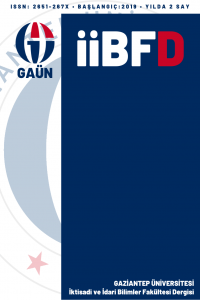IRAQI TURKMEN’S LEGAL POSITION IN THE 2005 IRAQI CONSTITUTION AFTER THE US OCCUPIED IRAQ IN 2003
When the USA occupied Iraq in 2003, it succeeded in demolishing Saddam Hussein’s Baathist regime with an aim to establish a democratic political system. To attempt to create a democratic and fair political system in Iraq was difficult for the USA because Iraq had never experienced democracy or had a democratic society. The Saddam regime was one of dictatorship, who governed with tribes, ethnic groups over a long duration. The establishment of a democratic political system involves a holistic integration of cultural, ethnic and religious bodies. Hence, it is important for constitutional writers and politicians to implement consociational theory for pluralization of society. Consociational democracy is based on Lijphart’s theory which explains power-sharing order in deeply divided ethnics society. It is a model of democratic governance that transforms politically differentiated cultures and groups into a stable democracy (Lijphart, 1969). However, the democratic system has not provided equal rights among different society in Iraq. For example, the Shiites have been given too much power in the federal government, the Kurds are happy because they have taken regional authority, while the Sunnis rights were neglected in current political orders. On the other hand, although Iraqi Turkomans are the third largest ethnic group in Iraq, their rights have been ignored significantly. According to UN Data (2018), currently the population of Iraq is approximately 40 million, and Iraqi Turkomans are a community of around 3-3.5 million (%9-10), predominantly living in the Iraqi provinces of Kirkuk, Baghdad, Mosul and Diya (Saatci, 2017). In fact, Iraqi Turkomans have a broad background in Iraq’s history. When the Turkmens came to Iraq in 760(A.C), they had administered Iraq until the end of World War I. Especially during the Ottoman Empire, Iraqi Turkomans possessed an important role in Iraq. After the First World War, when the Ottoman Empire lost power in Iraq, the Iraqi Turkomans lost their priority and became a second-class citizen. King Faysal who was the first king of Iraq, did not want to share his authority and he saw Turkmens as a threat for his state, and his policy continued until 2012. After Iraq was occupied, the US tried to establish a new democratic system, but Iraqi Turkomans were not represented equally such as Kurds or Shiites. Iraqi Turkomans also faced political and ethnic violence within both terms of office. When Iraq’s constitution was written, Brendan O’Leary and John McGarry predicted that new constitution would solve many problems among minorities, especially towards power sharing in Iraq. However, in practicality it failed and led to many problems, for example, many Sunnis or Turkmens were politically violated, and they decided to boycott the general election. This study will analyse the Iraqi Turkomans legal position to the 2005 Iraq Constitution by using Consociationalism theory, and qualitative methodology. As a theoretical framework, Lijphart’s four conditions of; power-sharing, the grand coalition, autonomy and minority veto will be used. The final aim of this paper is to demonstrate the rights of Iraqi Turkomans within previous Iraqi constitutions.
Anahtar Kelimeler:
Iraqi Turkomans, Iraq's Constitution
___
- Al-Hirmizi, (2008) The Turkmen Reality in Iraq, Istanbul;Kerkuk Vakfi. Al- Hirmizi,E (2005) The Turkmen and Iraqi Homeland, Istanbul:Kerkuk Vakfi Demirci, N (1990) Dünden Bugüne Kerkük (Kerkük’ün Siyasi Tarihi), istanbul: Renk OfsetDixon, P (2011) “Is Consociational Theory the Answer to Global Conflict? From the Netherlands to Northern Ireland and Iraq”, Political Studies Review, Vol:9, pp.309-322Esin, N (1976) “Irak Türkleri”, Türk Dünyası El Kitabı, Ankara: Türk Kültürünü Arastırma Enstitüsü Yayınları Iraqi Turkmens (2015) Accessed date: 10/03/2019 https://www.yenicaggazetesi.com.tr/reform-zulmune-turkmen-tepkisi-119779h.htm2005 Iraq Constitution (2005) accessed: 20/02/2019 https://www.constituteproject.org/constitution/Iraq_2005.pdf?lang=enIraq Temporary Law (2004) accessed date:01/03/2019 http://www.au.af.mil/au/awc/awcgate/iraq/tal.htm Jawad, S. N. (2013). The Iraqi Constitution: StructuralFlawsandPolitical Implications. (PDF versiyonu), LSE Middle East CentrePaper Series, Accessed date: 24.02.2019 http://www.lse.ac.uk/middleEastCentre/publications/PaperSeries/SaadJawad.pdfKayili, A. (2008) The Iraqi Turkmen 1921-2005, Istanbul: Kerkuk Vakfi YayinlariKatzman, K. (2004). Iraq: Transition to Sovereignty. (PDF versiyonu), Accessed date: 20.02.2019, http://www.fas.org/man/crs/RS21820.pdfKoprulu, Z (1996) Irak’ta Türk Varlığı, Ankara: Gazi UniversityLijphart, A (2008) Thinking About Democracy: Power Sharing and Majority Rule in Theory and Practice. New York: RoutledgeLijphart, A (1979) “Consociation and Federation: Conceptual and Empirical Links”, Canadian Journal of Political Science 12:3, pp. 499-515.Lijphart, A., (1980) Democracy in Plural Societies: A Comparative Exploration, London: Yale University Press. Lijphart, A., (2004) ‘’Constitutional Design for Divided Societies’’, Journal of Democracy, 15:2, pp.96-109. Lijphart, A (2000) “Power-sharing and Group Autonomy in the 1990s and 21st Century” Constitutional Design 2000 Conference. [pdf] California: University of California. [online], Available at: http://fopre.pbworks.com/f/Lijphart_Power,+Sharing.pdf Accessed date: 5 March 2019 Mengü, C (2012) ABD-Turkiye-Irak Ucgeninde Turkmen Meselesi, Istanbul:Yalın Yayıncılık.McGarry, J & O’Leary, B (2004) The Northern Ireland Conflict: Consociational Engagements. Oxford: Oxford University PressNakip, M (2008) The Historical and Cultural Identity of Kirkuk. Istanbul: Kerkuk VakfiOHCHR, (1965) International Convention on the Elimination of All Forms of Racial Discrimination, accessed date:03/03/2019, https://www.ohchr.org/en/professionalinterest/pages/cerd.aspx O’Leary, B (2008) “The Logics of Power-Sharing, Consociation and Pluralist Federations” in M. Weller and M. Barbara (ed) Settling Self-Determination Disputes: Complex Power-Sharing in Theory and Practice, Leiden: Martinus Nijhoff Publishers, pp. 47-58.Rivkin & Casey (2005) The New Iraq Constitution, accessed date 10/03/2019 https://www.heritage.org/node/17139/print-displaySaatci, S (2017) Tarihten Gunumuze Irak Turkmenleri. Istanbul: Otuken YayinlariSullivan, D (2005) “The Missing Pillars: A Look at the Failure of Peace in Burundi through the Lens of ArendLijphart's Theory of Consociational Democracy” The Journal of Modern African Studies, 43:1, pp.75-95Steiner, J (1981) The Consociational Theory and Beyond, Comparative Politics, 13:3, PP.339-354Q’Sullivan & Al-Saiedi, (2004) Choosing an Electoral System Iraq’s three Electoral Experiments, Their Results, and Their Political Implications, Belfer Center for Science and International Affairs, Harvard Kennedy School, accessed date: 01/03/2019 https://www.belfercenter.org/sites/default/files/legacy/files/MOS-RA%20Iraq%20Electoral%20Paper%20Working%20Draft%204%2029%2014.pdfThe United Nation, (2018) Iraq General Infirmation, on the (Internet) http://data.un.org/en/iso/iq.html (accessed date: 05/04/2019)
- ISSN: 2651-267X
- Yayın Aralığı: Yılda 2 Sayı
- Başlangıç: 2019
- Yayıncı: Gaziantep Üniversitesi
Sayıdaki Diğer Makaleler
ÖRGÜTLERDE ÇALIŞANLARIN YAŞADIKLARI ROL ÇATIŞMASININ ETKİLERİNİN İNCELENMESİ
Zafer ADIGÜZEL, İrem KÜÇÜKOĞLU
IRAQI TURKMEN’S LEGAL POSITION IN THE 2005 IRAQI CONSTITUTION AFTER THE US OCCUPIED IRAQ IN 2003
2003-2011 YILLARI ARASINDA TÜRKİYE'NİN ORTADOĞUDA YUMUŞAK GÜÇ UYGULAMASI VE SONUÇLARI
Demokrasi Açısından Türkiye'de Kayyum Uygulaması
